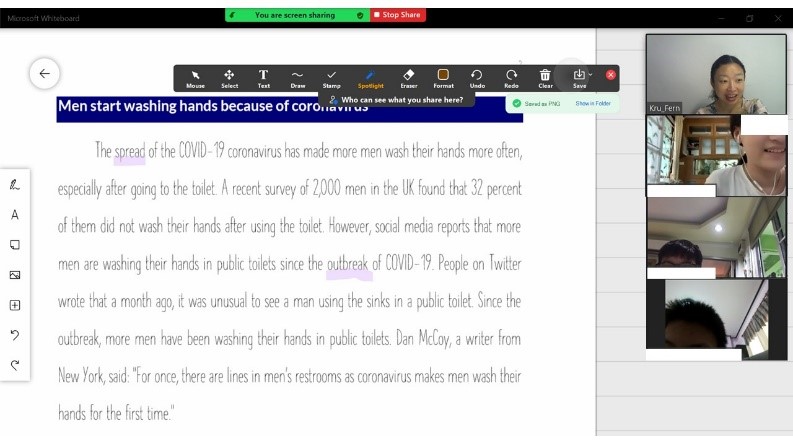Usage of reading comprehension to enhance word problem solving skills in mathematics
DOI:
https://doi.org/10.21070/jees.v6i2.1380Keywords:
word problem-solving, mathematics, reading comprehension, relationshipsAbstract
Thailand’s national tests, O-NET, are administered at the 3rd, 6th, and 9th grade levels. Mathematics is one of the tests. Achievement levels in Mathematics are consistently low. Several studies have shown that there is a link between Mathematics achievement and reading comprehension proficiency. Because previous studies were carried out in other jurisdictions, this study aims to correct this situation. Random sampling was used to select the population from a field of 66 grade six students who were enrolled in a special English programme in a private school, Bangkok. 21 students met the sampling criteria. They sat for a pretest and a posttest test in reading comprehension and in word problem-solving skills in mathematics. Treatment was carried out over a period of 8 weeks. Results showed a high positive correlation between reading comprehension skills and achievement in word problem-solving skills in Mathematics. The results can serve as an encouragement to teachers and their supervisors to focus more directly on improving the reading comprehension skills of students as a means to increasing students’ scores on mathematical word-solving tests.
HIGHLIGHTS:
- This study provided the results that these two-skill were positively related and the improvement on reading comprehension skill could induce the development in word problem-solving skills because they both were affected by working memory as an essential key factor.
- Providing stress-free reading environments and activities could be an interesting option to improve student’s word problem-solving skills in Mathematics.
- There is a high positive correlation between reading comprehension skills and achievement in word problem solving in Mathematics.
Downloads
References
Bohlmann, C. & Pretorius, E. (2008). Relationship between mathematics and literacy: Exploring some underlying factors. Pythagoras, 67, 42-55.
Bolt, S. E. & Thurlow, M. L. (2007). Item-level effects of the read aloud accommodation for students with reading disabilities. Assessment for Effective Intervention, 33(1), 15-28.
Bull, R., Espy, A., & Wiebe, S. (2008). Short-term memory, working memory, and executive functioning in pre-schoolers: Longitudinal predictors of mathematical achievement at age 7 years. Developmental Neuropsychology, 33(3), 205-228.
Capraro, R., Capraro, M. M., Rupley, W. (2012). Reading enhanced word problem solving: A Theoretical model. European Journal of Psychology of Education, 27(1), 91-114.
Cetintas, S., Si, L., Xin, Y. P., & Ron, T. (2010). A joint probabilistic classification model of relevant and irreverent sentences in mathematical word problems. Journal of Educational Data Mining, 2(3), 83-101.
Dekeyser, R. M. (2007). Practice in a second language: perspective from applied linguistics and cognitive psychology. New York: Cambridge University Press.
European Commission. (2012). EU High Level Group of Experts on Literacy. Final Report. Retrieved from http://icm.fch.lisboa.ucp.pt/resources/Documentos /CEPCEP/LITERACY_FINAL_REPORT.pdf.
Fuchs, L. S., Powell, S. R., Seethaler, P. M., Cirino, P. T., Fletcher, J. M., & Fuchs, D. (2009). Remediating number combination and word problem deficits among students with mathematical difficulties: A randomized control trial. Journal of Educational Psychology, 101, 561-567.
Gay, L. R., & Airasian (2003). Educational Research: Competencies for Analysis and Applications (7th ed.). Upper Saddle River, NJ: Merrill/Prentice Hall.
Geary, D. C., Hoard, M. K., Byrd-Craven, J., Nugent, L., & Numtee, C. (2007). Cognitive mechanisms underlying achievement deficits in children with mathematics learning disability. Child Development, 2, 249-269.
Haberlant, K. (1999). Human memory, Boston: Allyn & Bacon.
Kachru, B. & Nelson, C. (2001). Analysis English in a Global Context. London: Routledge.
Leshem, S. & Markovits, Z. (2013). Mathematics and English, two languages: teacher’s views. Education and Learning. 2(1), 211-221.
Mokhtari, K. & Reichard, C. A. (2002). Assessing students’ metacognitive awareness of reading strategies. Journal of Educational Psychology, 94(2), 249-259.
Morningstar, M. E., Shogren, K. A., Lee, H., & Born, K. (2015). Preliminary lessons about supporting participation and learning in inclusive classrooms. Research and Practice for Persons with Severe Disabilities, 40(3).
NIETS. (2018). O-NET scores of primary 6 students between B.C. 2014-2017 report. National Institute of Educational Testing Service (Public Organization). Thailand.
Rovinelli, R.J. & Hambleton, R. K. (1977). On the use of content specialists in the assessment of criterion-referenced test item validity. Dutch Journal of Education Research, 2, 49-60.
Smith, J. L., Sáez, L., & Doabler, C. T. (2016). Using explicit and systematic instruction to support working memory. Teaching Exceptional Children, 48(6), 275-281.
Swanson, H. L., Jerman, O., & Zheng, X. (2009). Math disabilities and reading disabilities: Can they be separated?. Psychoeducational Assessment, 27(3), 175-196.
Swanson, H. L., Lussier, C. M., & Orosco, M. J. (2015). Cognitive strategies, working memory, and growth in word problem-solving in children with math difficulties. Journal of Learning Disabilities, 48(4), 339-358.
Welsh, J. A., Nix, R. L., Blair, C., Bierman, K. L., & Nelson, K. E. (2010). The development of cognitive skills and gains in academic school readiness for children from low income families. Journal of Educational Psychology, 102, 43-53.
WLF. (2012). The Economic & Social Cost of Literacy. World Literacy Foundation. Retrieved from https://worldliteracyfoundation.org/wp-content/uploads/2019/06/ TheEconomicSocialCostofIlliteracy-2.pdf.
Wright, D. (2016). 5 million adults lack basic literacy and numeracy skills. Retrieved September 23, 2019, from https://www.jrf.org.uk/press/5-million-adults-lack-basic-literacy-and-numeracy-skills.

Published
How to Cite
Issue
Section
License
Copyright (c) 2021 Preyanan Supontawanit, Supinda Lertlit

This work is licensed under a Creative Commons Attribution 4.0 International License.







